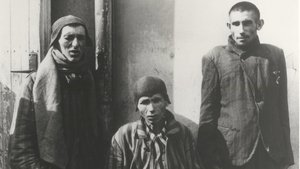In 1984, there were more bank failures in the US than at any time since the Great Depression. Correspondent Judy Woodruff investigates one of the largest banks that failed, Penn Square in Oklahoma City, and another which nearly failed, Continental Illinois in Chicago, to examine the implications on the nation's banking system.
You go to rent an apartment and are turned down without any obvious reason. Then you find out your name is in a computer file of undesirable tenants and every other landlord in the city has access to the information. Correspondent Robert Krulwich investigates computerized information systems and the issues of privacy they raise.

Forty years ago, Allied troops invaded Germany and liberated Nazi death camps. They found unspeakable horrors which still haunt the world's conscience. Frontline presents the world broadcast of a 1945 film made by British and American film crews who were with the troops liberating the camps. The film was directed in part by Alfred Hitchcock and is broadcast for the first time in its entirety on Frontline.
Experts estimate there are at least four million child sexual abusers in the US, and they do not fit our stereotypes. Almost half of those guilty of incest also molest children outside the family. Many also commit adult rape-and they come from every social background. Should they be treated, punished, or both? Frontline examines a controversial Seattle, Washington, program aimed at treating child sexual abusers.
In 1979, the Sandinistas led a revolution that overthrew the Somoza dynasty which had ruled Nicaragua for almost 50 years. It was a revolution the US first tried to prevent, then tried to court, and later tried to undermine. Part 3 traces the evolution of US involvement in Nicaragua and the struggle for control of the revolution.
The Cuban revolution of the 1950's was the first successful challenge to US preeminence in the Western hemisphere. Part 2 looks at the roots of the revolution, Fidel Castro's rise to power, the establishment of the first Communist state in the Americas, the support for his revolution abroad, and Cuba's troubled history with the United States.
From the Spanish-American War in 1898 until the 1950's, US preeminence in Central America and the Caribbean was never successfully challenged. Part 1 looks at these turbulent years that set the stage for today's crises-from the glory days of building the Panama Canal, through the early US Marine occupation of Nicaragua, to the Cold War crisis in Guatemala in 1954, which resulted in the CIA's first 'covert' war in the region.
Every two years, a desire to represent their home districts in Washington brings a group of first-time freshmen congressmen to the nation's capital on the shores of the Potomac river. Frontline follows two newly elected representatives from their homes to Washington where they experience the rewards-and the frustrations-of making the transition from citizen to congressman.
Pulitzer Prize-winning investigative reporter Seymour Hersh presents his first television investigation for Frontline. After six months of work, Hersh uncovers the story of a Pakistani businessman who tried to ship electrical devices which can be used as nuclear bomb triggers out of the US to Pakistan.
Seventy-two year-old James Hawkins,Sr. has turned his home and business into an armed camp. Living in the Watts section of Los Angeles, Hawkins is fighting gang members who live across Imperial Highway. It's a war being fought on the streets and in the courtroom between gang members and the Hawkins family.
Frontline takes a rare look inside the new Vietnam, 10 years after the fall of Saigon and the US pullout. While the Vietnamese celebrate their victory, the countryside remains scarred and war-torn. Frontline examines the legacies of the longest and most unpopular war in American history on the country where it was fought.